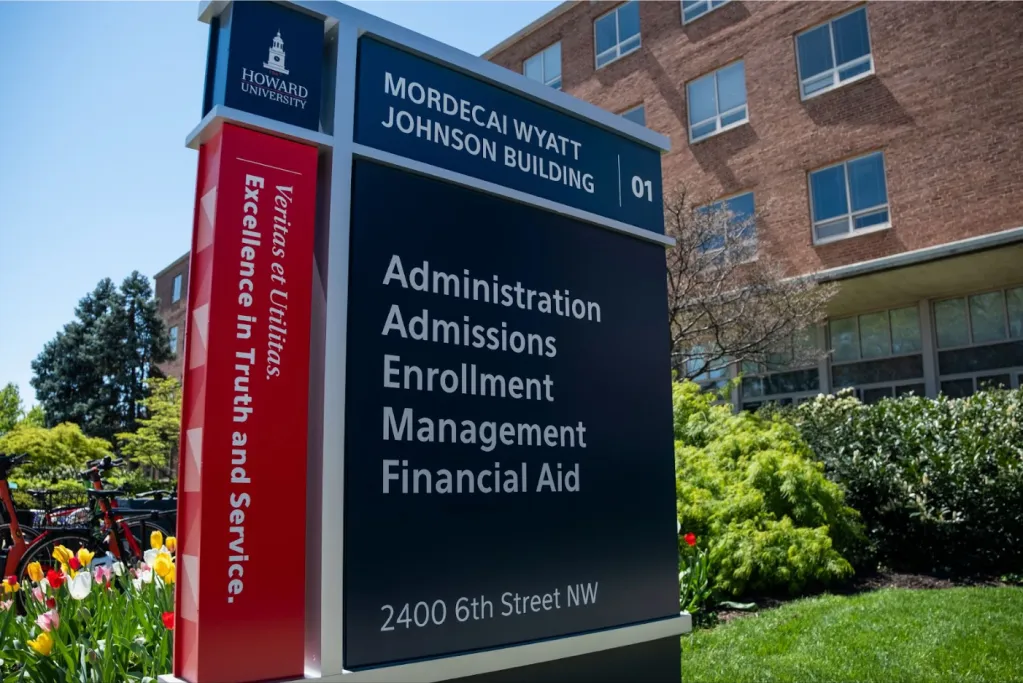Copyright newsone

Source: The Dig / The Dig The waiting room outside Howard University’s financial aid office is crowded with students holding folders, laptops, phones, and the weight of their anxiety. One student sighs loudly as she scrolls through her account balance. Another leans on a friend’s shoulder, whispering about missing paperwork. A third paces in the hallway, phone pressed to her ear, explaining her situation to a parent. Behind the glass window, staff shuffle through stacks of files and answer questions as fast as they can, but the line of students waiting only grows. Parents are here too. A mother with her arms folded, jaw tight, murmuring under her breath. A father flips through a folder of papers, muttering about deadlines and a Parent-Plus loan. Staff sit at cluttered desks, fingers flying across keyboards, answering calls, and trying to calm anxious voices. The air hums with frustration and clipped voices on speakerphones, the buzz of cell alerts, and the low whir of printers spitting out forms. Financial aid officers tap furiously at their keyboards, juggling phone calls, emails, and in-person questions, their polite tones stretched thin by the constant press of need as the line only grows. This is the first school semester under the Trump administration’s new “Big Beautiful Bill.” For many Howard University students and their parents, confusion has become routine. It’s October and the semester is halfway through, yet these scenes have continued, and they are about more than long waits. They reveal the financial tightrope that students at Howard and other colleges are walking. With tuition rising and federal aid formulas rewritten under the new law, families are pressing harder for help. The strain shows on both sides of the counter, as staff face mounting workloads and students fear being dropped from classes mid-semester. “We’ve grown upward of 4,000 to 5,000 students over the past several years,” Keyana Scales, Howard’s Senior Vice President for Enrollment, said. “More students are interested in Howard, and they understand the power of a Howard education. But with that comes an increased demand on resources.” That demand is felt daily by financial aid officers, who must balance federal compliance with the emotional realities of students in crisis. They explain the same forms over and over, field complaints about slow systems, and watch students slump in their chairs or tap their feet in frustration. Many quietly leave rather than speak up, embarrassed by the gap between what they can pay and what the university requires. Others face registration holds that keep them from attending class even as midterms approach. Scales stressed that the role of a financial aid officer is “multifaceted” because it requires both technical knowledge of federal regulations and interpersonal skills to calm students and families. “They’re not just processing aid,” she said. “They’re fielding panic.” Source: Zoe Cummings / Zoe Cummings The “Big Beautiful Bill” has reshaped student aid nationwide, tightening eligibility rules, altering how Pell Grants are calculated, and reducing the amount many students receive. It also imposed new limits on Parent PLUS loans and redirected funding away from federal work-study programs, leaving institutions with fewer resources to support low-income students. At Howard, where a majority of students rely on Pell Grants, the changes hit especially hard. Students who expected one aid package this year often received something smaller, with fewer options for families to fill the gap. “This is not an issue that is unique to Howard,” Scales said. “But because our mission is to support students who are traditionally marginalized and underserved, it amplifies what we’re seeing at HBCUs.” Across the country, universities are reporting the same ripple effects. At North Carolina A&T, financial aid counselors say more students are juggling multiple jobs to stay enrolled. Inside Higher Ed recently reported that federal grant losses and delayed aid disbursements have intensified financial strain at public HBCUs nationwide. In Florida, leaders at Florida A&M University warned that the suspension of key federal scholarship programs and longstanding underfunding are forcing students and families to seek alternative ways to pay for school through emergency funds, side jobs, or crowdfunding campaigns. At smaller private HBCUs, administrators describe an even bleaker picture: delayed federal disbursements and shrinking aid pools are pushing some students to take semester breaks or withdraw altogether, a trend that mirrors the broader underfunding crisis highlighted by Forbes and other higher education analysts. For financial aid officers, the changes mean not just more paperwork but more emotional weight. Students walk in with tears in their eyes or frustration boiling over, and staff are expected to absorb it while staying calm. The office reflects that strain: stacks of files crowd desks, phones ring nonstop, and conversations often end with the promise to “check again later.” Now, the situation has grown even more precarious. The ongoing government shutdown has stalled federal disbursements and verification checks, leaving many students in limbo. Refunds are delayed, phone lines to federal agencies go unanswered, and universities are left improvising short-term solutions to keep students from losing housing or being dropped from classes. It’s devastating timing because we’re halfway through the semester, and students still don’t know if their aid is real. Scales said Howard has invested in training to help staff manage both compliance and compassion. She herself holds bi-weekly office hours to listen directly to students. “I can’t always promise an immediate solution,” she said, “but I will always listen. My role is to ensure that students are getting to and through the institution as seamlessly as possible. Howard’s struggle reflects a national affordability crisis. According to federal data, more than 70% of HBCU students receive Pell Grants, yet the average unmet financial need at these schools remains among the highest in higher education. At Howard, tuition has steadily increased while aid has not kept pace, creating a widening gap that institutions scramble to fill. For students whose families already live paycheck to paycheck, the new aid formula feels less like reform and more like abandonment. Media coverage of the “Big Beautiful Bill” has largely focused on its political messaging, but on campuses like Howard, its effects are felt in everyday delays, questions, and compromises. Each unanswered email or delayed refund becomes a potential crisis. That means rent unpaid, meals skipped, or classes dropped. By late afternoon, the line in the financial aid office hasn’t shortened. Students shift backpacks from one shoulder to another, scroll anxiously on their phones, and clutch the forms they hope will resolve their accounts. Behind the counter, staff keep working through the pile. In this new era of aid, compounded by a government shutdown and mid-semester uncertainty, survival, for both students and administrators, means more waiting, more worry, and fewer solutions. Zoe Cummings is a senior honors journalism major at Howard University, covering HBCU news, politics, and culture. Please send tips to zoe.cummings@bison.howard.edu and follow on instagram @zoesxphia for more content. SEE ALSO: Limited Booster Access Sparks Concern Among D.C. Residents Introducing The Bison ONE Newsroom, A NewsOne And HU Collab



